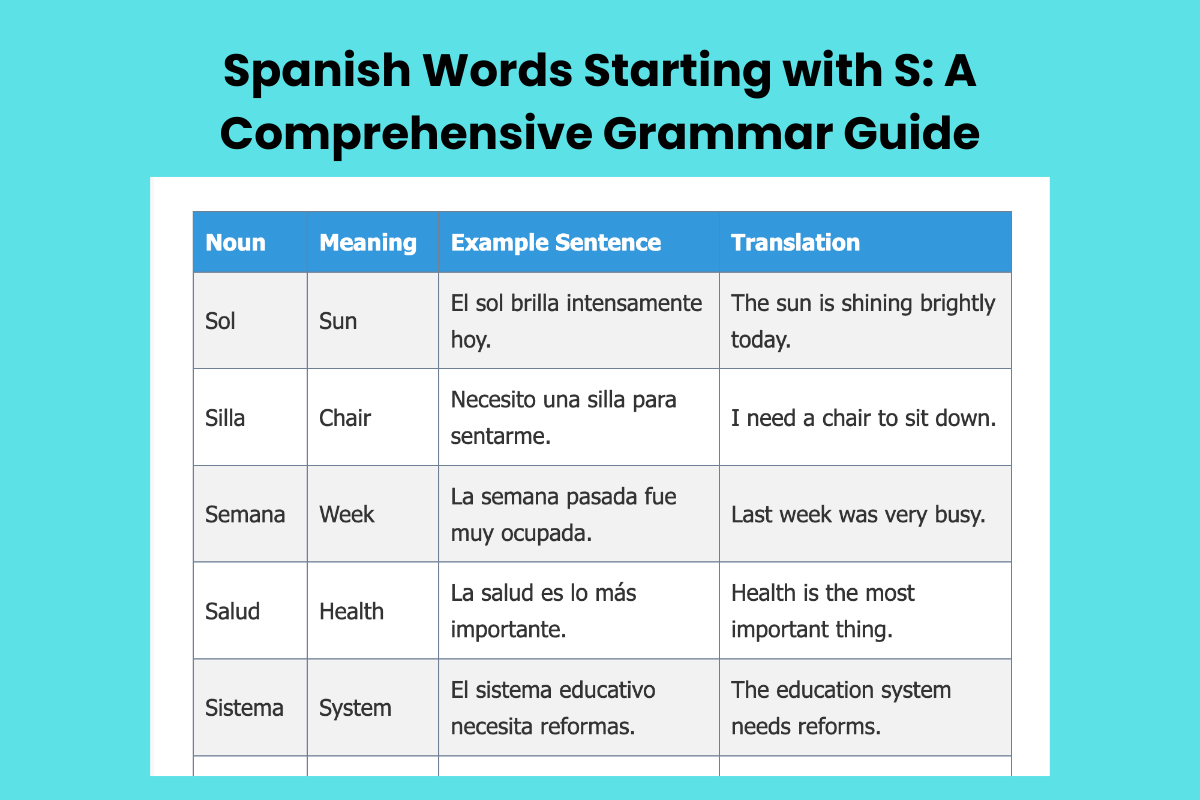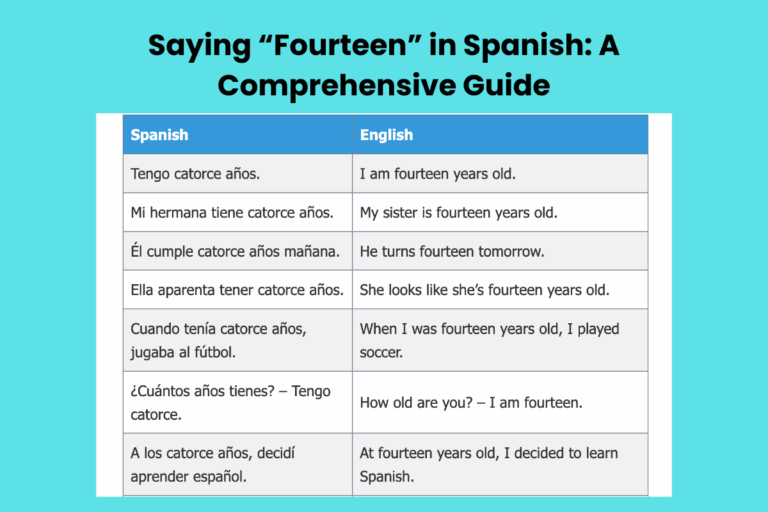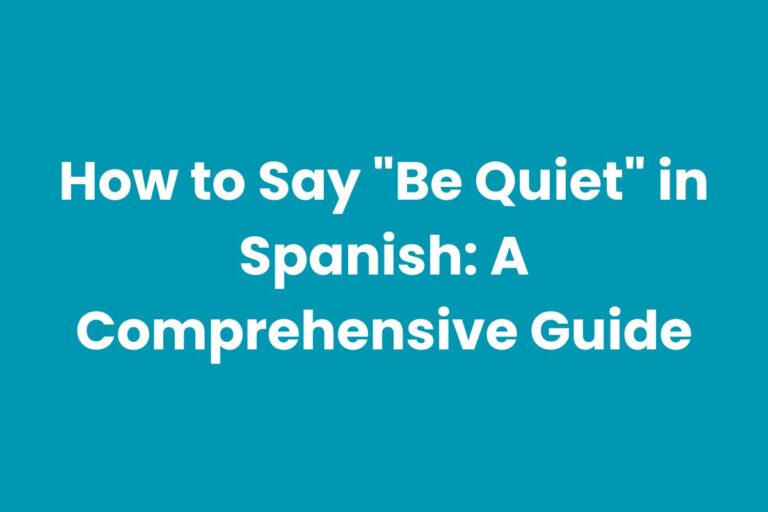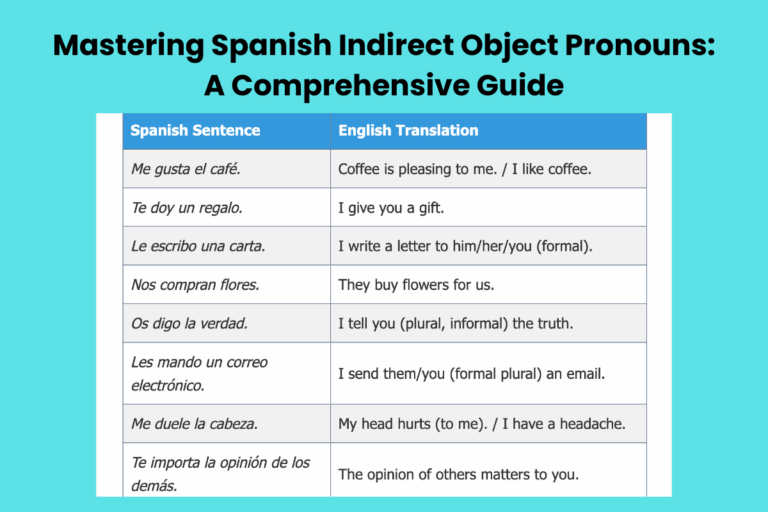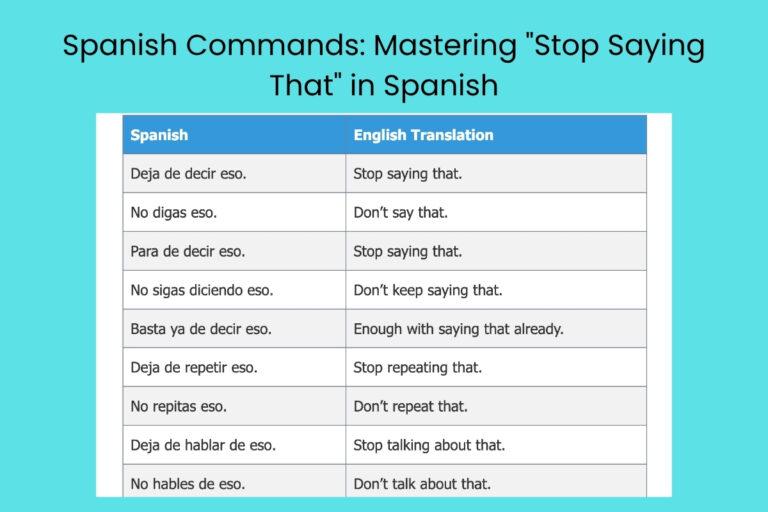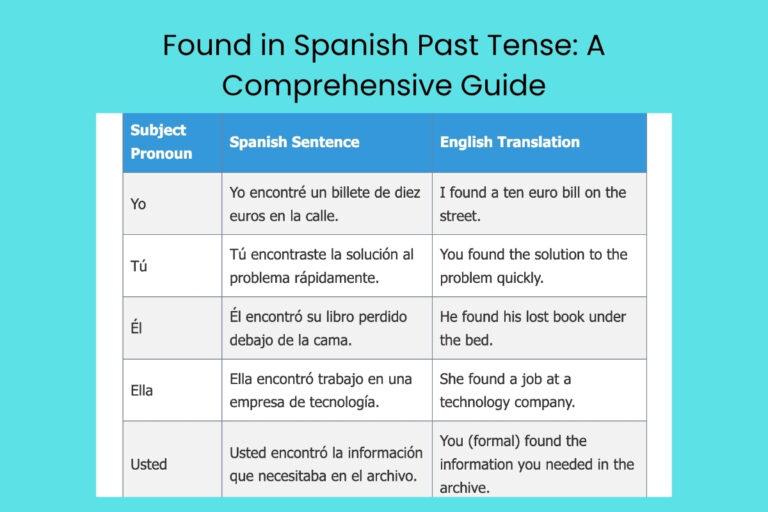Spanish Words Starting with S: A Comprehensive Grammar Guide
Mastering Spanish vocabulary involves understanding the nuances of words, including those that begin with specific letters. This article focuses on Spanish words that start with “s,” exploring their various forms, meanings, and grammatical functions.
Understanding these words is crucial for building a robust Spanish vocabulary and improving comprehension and fluency. This guide is designed for Spanish learners of all levels, from beginners to advanced students, providing a structured approach to learning and using these essential words effectively.
By delving into the intricacies of “s” words, learners can enhance their reading, writing, and speaking skills in Spanish. The article covers common words, their definitions, usage rules, and common mistakes to avoid, providing a well-rounded learning experience.
Numerous examples and practice exercises are included to reinforce understanding and promote active learning. This comprehensive guide aims to equip learners with the knowledge and skills necessary to confidently use Spanish words starting with “s” in various contexts.
Table of Contents
- Introduction
- Definition of Spanish Words Starting with S
- Structural Breakdown
- Types and Categories
- Examples
- Usage Rules
- Common Mistakes
- Practice Exercises
- Advanced Topics
- FAQ
- Conclusion
Definition of Spanish Words Starting with S
Spanish words starting with the letter “s” encompass a wide range of grammatical categories, including nouns, verbs, adjectives, adverbs, pronouns, prepositions and conjunctions. They play a crucial role in constructing sentences and conveying meaning in the Spanish language.
The letter “s” itself is a consonant that typically represents a voiceless alveolar fricative sound (/s/), similar to the “s” in the English word “sun.” Understanding the function and context of these words is essential for effective communication in Spanish.
The function of words starting with “s” varies depending on their grammatical category. Nouns (sustantivos) name people, places, things, or ideas, verbs (verbos) express actions or states of being, adjectives (adjetivos) describe nouns, and adverbs (adverbios) modify verbs, adjectives, or other adverbs. Pronouns (pronombres) replace nouns, prepositions (preposiciones) show relationships between words, and conjunctions (conjunciones) connect words, phrases, or clauses. Each category contributes uniquely to the structure and meaning of Spanish sentences. For example, the noun “sol” (sun) names an object, while the verb “ser” (to be) expresses a state of being. The adjective “serio” (serious) describes a noun, and the adverb “siempre” (always) modifies a verb.
Structural Breakdown
The structure of Spanish words starting with “s” follows the general morphological rules of the Spanish language. Many of these words are derived from Latin, reflecting the historical development of Spanish.
The letter “s” can appear at the beginning of a root word or as part of a prefix or suffix. Prefixes like “sub-” (under) or “sobre-” (over) can modify the meaning of a root word, while suffixes can indicate grammatical features such as gender (masculine or feminine) and number (singular or plural) for nouns and adjectives, or tense and mood for verbs.
In verb conjugations, the letter “s” often appears in the endings of certain tenses and persons. For example, in the present tense of regular -ar verbs, the second-person singular (tú) form ends in “-as,” as in “hablas” (you speak). Similarly, in the preterite tense of regular -er and -ir verbs, the second-person singular form ends in “-iste,” as in “comiste” (you ate) or “viviste” (you lived). Understanding these patterns helps learners recognize and use different verb forms correctly. Additionally, the presence of “s” can sometimes indicate plurality in nouns, such as “libros” (books) or “mesas” (tables), where the “-s” is added to the singular form to create the plural.
Types and Categories
Nouns
Nouns (sustantivos) are words that name people, places, things, or ideas. Spanish nouns starting with “s” are diverse and cover a wide range of concepts. They are categorized by gender (masculine or feminine) and number (singular or plural), which affects the articles and adjectives that modify them. For example, “sol” (sun) is a masculine noun, while “silla” (chair) is a feminine noun. Knowing the gender of a noun is crucial for correct grammatical usage.
Some common examples of Spanish nouns starting with “s” include: sol (sun), silla (chair), semana (week), salud (health), sistema (system), secreto (secret), servicio (service), and sociedad (society). These nouns represent concrete objects, abstract concepts, and various aspects of daily life. Understanding and using these nouns correctly is essential for building a strong Spanish vocabulary and expressing oneself effectively in Spanish.
Verbs
Verbs (verbos) are words that express actions, states of being, or occurrences. Spanish verbs starting with “s” are conjugated according to tense, mood, and person. They are essential for forming sentences and conveying meaning. Common examples include ser (to be), saber (to know), salir (to leave), sentir (to feel), seguir (to follow), soler (to usually do), and soñar (to dream).
Each verb has its own conjugation pattern, which must be learned to use it correctly in different contexts. For instance, the verb “ser” (to be) is irregular and has different forms in each tense and person.
Understanding verb conjugations is crucial for constructing grammatically correct sentences and expressing actions and states of being accurately. Regular practice and exposure to different verb forms will help learners master Spanish verbs starting with “s.”
Adjectives
Adjectives (adjetivos) are words that describe nouns, providing more information about their qualities or characteristics. Spanish adjectives starting with “s” agree in gender and number with the nouns they modify. This means that an adjective must be masculine or feminine, singular or plural, to match the noun it describes. Examples include serio (serious), simple (simple), sincero (sincere), solo (alone), similar (similar), and siguiente (following).
For example, if you want to describe a “man” (hombre), which is masculine and singular, you would use “serio” (serious): “un hombre serio” (a serious man). If you want to describe “women” (mujeres), which is feminine and plural, you would use “serias” (serious): “mujeres serias” (serious women). Understanding adjective agreement is crucial for constructing grammatically correct and natural-sounding sentences in Spanish. Pay close attention to the gender and number of the nouns you are describing to ensure proper adjective usage.
Adverbs
Adverbs (adverbios) are words that modify verbs, adjectives, or other adverbs, providing more information about how, when, where, or to what extent an action is performed or a quality is exhibited. Spanish adverbs starting with “s” include words like siempre (always), sí (yes), seguramente (surely), simplemente (simply), sólo (only), and suavemente (softly).
Adverbs do not change their form to agree with the words they modify, making them relatively straightforward to use. For example, “siempre” (always) can be used with any verb without changing its form: “Siempre estudio español” (I always study Spanish).
Understanding the different types of adverbs and how they modify other words is essential for adding detail and nuance to your Spanish sentences. Practice using adverbs in various contexts to improve your fluency and expressiveness.
Pronouns
Pronouns (pronombres) are words that replace nouns, avoiding repetition and making sentences more concise. Spanish pronouns starting with “s” include: se (reflexive pronoun), sí (reflexive pronoun), su (his, her, its, your [formal, singular]), and sus (his, her, its, your [formal, plural]). These pronouns serve different functions and are essential for constructing grammatically correct sentences.
The pronoun “se” is commonly used as a reflexive pronoun, indicating that the subject of the verb is also the object of the verb, as in “Él se lava” (He washes himself). The pronoun “sí” is used as a reflexive pronoun after prepositions, as in “Ella piensa en sí misma” (She thinks about herself).
The possessive pronouns “su” and “sus” indicate possession, as in “Este es su libro” (This is his/her/your [formal, singular] book) and “Estos son sus libros” (These are his/her/your [formal, plural] books). Understanding the different uses of these pronouns is crucial for accurate and fluent Spanish communication.
Prepositions
Prepositions (preposiciones) are words that show the relationship between a noun or pronoun and other words in a sentence. While there are no common primary prepositions that exclusively start with “s” in Spanish, the concept of prepositions is crucial for understanding sentence structure and relationships between elements. Words like “según” (according to) can function prepositionally and begin with ‘s’.
For example, “según” can be used to indicate agreement or source, as in “Según el periódico, va a llover” (According to the newspaper, it’s going to rain). Although there are not many prepositions starting with ‘s’, understanding how prepositional phrases function is vital for constructing complex and meaningful sentences.
Focus on learning common prepositions and their uses to enhance your Spanish proficiency.
Conjunctions
Conjunctions (conjunciones) are words that connect words, phrases, or clauses. Spanish conjunctions starting with “s” include si (if), sino (but, rather), and sin embargo (however). These conjunctions play a crucial role in linking ideas and creating complex sentences.
The conjunction “si” is used to introduce conditional clauses, as in “Si llueve, no iremos al parque” (If it rains, we will not go to the park). The conjunction “sino” is used to contrast two ideas, as in “No es rico, sino pobre” (He is not rich, but poor).
The conjunction “sin embargo” introduces a contrasting statement, as in “Estaba cansado; sin embargo, fue a la fiesta” (He was tired; however, he went to the party). Mastering the use of these conjunctions will allow you to express complex ideas and create more sophisticated sentences in Spanish.
Examples
Nouns Examples
Here are some examples of Spanish nouns starting with “s,” along with their meanings and example sentences. The table below is designed to help you understand how they are used in context.
| Noun | Meaning | Example Sentence | Translation |
|---|---|---|---|
| Sol | Sun | El sol brilla intensamente hoy. | The sun is shining brightly today. |
| Silla | Chair | Necesito una silla para sentarme. | I need a chair to sit down. |
| Semana | Week | La semana pasada fue muy ocupada. | Last week was very busy. |
| Salud | Health | La salud es lo más importante. | Health is the most important thing. |
| Sistema | System | El sistema educativo necesita reformas. | The education system needs reforms. |
| Secreto | Secret | Guarda este secreto con cuidado. | Keep this secret carefully. |
| Servicio | Service | El servicio al cliente es excelente. | The customer service is excellent. |
| Sociedad | Society | La sociedad está cambiando rápidamente. | Society is changing rapidly. |
| Suerte | Luck | ¡Buena suerte en tu examen! | Good luck on your exam! |
| Silencio | Silence | Por favor, guarda silencio en la biblioteca. | Please be quiet in the library. |
| Sabor | Flavor | Este plato tiene un sabor delicioso. | This dish has a delicious flavor. |
| Sueño | Dream | Tuve un sueño extraño anoche. | I had a strange dream last night. |
| Sonrisa | Smile | Su sonrisa es muy contagiosa. | Her smile is very contagious. |
| Sangre | Blood | Se cortó y le salió sangre. | He cut himself and blood came out. |
| Sombra | Shadow | El árbol proyecta una gran sombra. | The tree casts a large shadow. |
| Sopa | Soup | Me gusta tomar sopa cuando hace frío. | I like to have soup when it’s cold. |
| Sal | Salt | Necesito añadir sal a la comida. | I need to add salt to the food. |
| Saco | Jacket | Llevo un saco porque hace frío. | I am wearing a jacket because it is cold. |
| Suelo | Floor | El suelo está limpio. | The floor is clean. |
| Susto | Fright | Me dio un susto cuando apareció de repente. | He gave me a fright when he appeared suddenly. |
| Señal | Sign | Hay una señal de tráfico allí. | There is a traffic sign there. |
| Socio | Partner | Él es mi socio en este negocio. | He is my partner in this business. |
| Salón | Living Room | El salón está decorado con buen gusto. | The living room is tastefully decorated. |
| Seda | Silk | Este vestido está hecho de seda. | This dress is made of silk. |
| Sello | Stamp | Necesito un sello para enviar esta carta. | I need a stamp to send this letter. |
This table illustrates how common Spanish nouns starting with ‘s’ are used in sentences. By studying these examples, you can improve your comprehension and learn to use these words correctly in your own speech and writing.
Verbs Examples
Below are examples of Spanish verbs starting with “s,” along with their meanings and example sentences. This table will help you see how verbs are conjugated and used in context.
| Verb | Meaning | Example Sentence | Translation |
|---|---|---|---|
| Ser | To be | Yo soy estudiante. | I am a student. |
| Saber | To know | Ella sabe hablar español. | She knows how to speak Spanish. |
| Salir | To leave | Nosotros salimos a las cinco. | We leave at five o’clock. |
| Sentir | To feel | Él siente mucho frío. | He feels very cold. |
| Seguir | To follow | Debes seguir las instrucciones. | You must follow the instructions. |
| Soler | To usually do | Suelo ir al gimnasio por la mañana. | I usually go to the gym in the morning. |
| Soñar | To dream | Anoche soñé contigo. | Last night I dreamt about you. |
| Subir | To go up, to climb | Vamos a subir la montaña. | We are going to climb the mountain. |
| Sufrir | To suffer | No quiero que sufras. | I don’t want you to suffer. |
| Sumar | To add | Necesitamos sumar los gastos. | We need to add up the expenses. |
| Superar | To overcome | Puedes superar cualquier obstáculo. | You can overcome any obstacle. |
| Sustituir | To substitute | Puedes sustituir el azúcar por miel. | You can substitute sugar with honey. |
| Suspender | To fail | No quiero suspender el examen. | I don’t want to fail the exam. |
| Sostener | To hold, to support | Puedes sostener este libro, por favor? | Can you hold this book, please? |
| Situar | To place, to locate | Vamos a situar la mesa aquí. | We are going to place the table here. |
| Servir | To serve | ¿Puedo servirte algo de beber? | Can I serve you something to drink? |
| Seducir | To seduce | No intentes seducirme. | Don’t try to seduce me. |
| Silenciar | To silence | Por favor, silencia tu teléfono. | Please silence your phone. |
| Simplificar | To simplify | Debemos simplificar el proceso. | We should simplify the process. |
| Sintonizar | To tune | Necesito sintonizar la radio. | I need to tune the radio. |
| Sobrevivir | To survive | Es difícil sobrevivir en esta situación. | It is difficult to survive in this situation. |
| Solucionar | To solve | Vamos a solucionar este problema. | We are going to solve this problem. |
| Sorprender | To surprise | Quiero sorprender a mi amigo. | I want to surprise my friend. |
| Separar | To separate | Debemos separar la basura. | We should separate the trash. |
| Sacar | To take out | Voy a sacar la basura. | I am going to take out the trash. |
This table showcases the variety of Spanish verbs that begin with ‘s’. Pay attention to the different conjugations and how they are used within the sentences.
This will greatly enhance your understanding of verb usage.
Adjectives Examples
Here are examples of Spanish adjectives starting with “s,” along with their meanings and example sentences. Remember that adjectives must agree in gender and number with the nouns they modify.
| Adjective | Meaning | Example Sentence | Translation |
|---|---|---|---|
| Serio/a | Serious | Él es un hombre serio. / Ella es una mujer seria. | He is a serious man. / She is a serious woman. |
| Simple | Simple | Es un problema simple. / Es una solución simple. | It is a simple problem. / It is a simple solution. |
| Sincero/a | Sincere | Es un amigo sincero. / Es una amiga sincera. | He is a sincere friend. / She is a sincere friend. |
| Solo/a | Alone | Me siento solo. / Me siento sola. | I feel alone. |
| Similar | Similar | Son ideas similares. | They are similar ideas. |
| Siguiente | Following | El siguiente capítulo es interesante. | The following chapter is interesting. |
| Sabio/a | Wise | Él es un hombre sabio./ Ella es una mujer sabia. | He is a wise man. / She is a wise woman. |
| Sagrado/a | Sacred | Este lugar es sagrado. | This place is sacred. |
| Saludable | Healthy | Es importante tener una dieta saludable. | It is important to have a healthy diet. |
| Secreto/a | Secret | Es una información secreta. | It is secret information. |
| Sensible | Sensible | Es una persona muy sensible. | He/She is a very sensible person. |
| Silencioso/a | Silent | El bosque es silencioso. | The forest is silent. |
| Sociable | Sociable | Es un niño sociable. | He is a sociable boy. |
| Suave | Soft | La tela es muy suave. | The fabric is very soft. |
| Sólido/a | Solid | El edificio tiene una base sólida. | The building has a solid foundation. |
| Superior | Superior | Este producto es de calidad superior. | This product is of superior quality. |
| Sorprendente | Surprising | Es una noticia sorprendente. | It’s a surprising news. |
| Satisfecho/a | Satisfied | Estoy satisfecho con el resultado. | I am satisfied with the result. |
| Sano/a | Healthy | Llevo un estilo de vida sano. | I lead a healthy lifestyle. |
| Severo/a | Severe | El invierno fue severo. | The winter was severe. |
| Simpático/a | Nice | Es un chico simpático. | He is a nice guy. |
| Singular | Unique | Es un caso singular. | It is a unique case. |
| Sobrio/a | Sober | Está sobrio ahora. | He is sober now. |
| Sucio/a | Dirty | El coche está sucio. | The car is dirty. |
| Seguro/a | Safe | Es un lugar seguro. | It is a safe place. |
This table provides a comprehensive list of Spanish adjectives that start with the letter ‘s’. Remember to adjust gender and number to match the nouns they modify for grammatically correct sentences.
Adverbs Examples
Here are examples of Spanish adverbs starting with “s,” along with their meanings and example sentences. Adverbs do not change their form to agree with the words they modify.
| Adverb | Meaning | Example Sentence | Translation |
|---|---|---|---|
| Siempre | Always | Siempre estudio por la noche. | I always study at night. |
| Sí | Yes | ¿Vas a venir? Sí, voy a venir. | Are you coming? Yes, I am coming. |
| Seguramente | Surely | Seguramente llegará tarde. | He will surely arrive late. |
| Simplemente | Simply | Simplemente no lo entiendo. | I simply don’t understand it. |
| Sólo | Only | Sólo quiero ayudarte. | I only want to help you. |
| Suavemente | Softly | Cierra la puerta suavemente. | Close the door softly. |
| Súbitamente | Suddenly | Súbitamente empezó a llover. | Suddenly it started to rain. |
| Similarmente | Similarly | Similarmente, podemos resolver este problema. | Similarly, we can solve this problem. |
| Secretamente | Secretly | Secretamente, le admiro. | Secretly, I admire him/her. |
| Separadamente | Separately | Debemos trabajar separadamente. | We must work separately. |
| Seriamente | Seriously | Debemos tomar este asunto seriamente. | We must take this matter seriously. |
| Silenciosamente | Silently | Entró silenciosamente en la habitación. | He/She entered the room silently. |
| Siquiera | Even | Ni siquiera lo intentó. | He/She didn’t even try. |
| Sobradamente | More than enough | Tiene sobradamente talento para esto. | He/She has more than enough talent for this. |
| Solamente | Only | Solamente quiero lo mejor para ti. | I only want the best for you. |
| Subordinadamente | Subordinately | Actuó subordinadamente. | He/She acted subordinately. |
| Sucesivamente | Successively | Se repitió sucesivamente. | It was repeated successively. |
| Sumamente | Extremely | Es sumamente importante. | It is extremely important. |
| Superficialmente | Superficially | Analizó el problema superficialmente. | He/She analyzed the problem superficially. |
| Supuestamente | Supposedly | Supuestamente iba a venir. | He/She was supposedly going to come. |
| Sensatamente | Sensibly | Actuó sensatamente. | He/She acted sensibly. |
| Similarmente | Similarly | Similarmente, podemos abordar este tema. | Similarly, we can address this issue. |
| Sin duda | Without a doubt | Sin duda, es el mejor. | Without a doubt, he/she is the best. |
| Sinceramente | Sincerely | Sinceramente, no lo sé. | Sincerely, I don’t know. |
| Sistemáticamente | Systematically | Lo hizo sistemáticamente. | He/She did it systematically. |
This table offers a variety of adverbs starting with the letter ‘s’ and demonstrates how they modify verbs, adjectives, or other adverbs within a sentence. By studying these examples, you can learn to add greater detail and precision to your Spanish.
Usage Rules
Spanish words starting with “s” follow the general grammar rules of the Spanish language. Nouns must agree in gender and number with articles and adjectives.
Verbs must be conjugated correctly according to tense, mood, and person. Adjectives must agree in gender and number with the nouns they modify.
Adverbs do not change their form. Pronouns must be used correctly to replace nouns and avoid repetition.
Prepositions and conjunctions must be used to connect words, phrases, and clauses logically.
One important rule to remember is that Spanish adjectives usually come after the noun they modify, unlike in English. For example, instead of saying “a red car,” you would say “un coche rojo” (a car red).
Also, possessive adjectives like “su” (his, her, its, your [formal, singular]) can be ambiguous, so it’s often necessary to clarify with a prepositional phrase, such as “el libro de él” (his book) or “el libro de ella” (her book). Understanding these rules and exceptions is crucial for using Spanish words starting with “s” correctly and effectively.
Common Mistakes
One common mistake is confusing the gender of nouns. For example, saying “la sol” instead of “el sol” (the sun).
Another mistake is incorrect verb conjugation, such as using the wrong tense or person. For example, saying “Yo ser estudiante” instead of “Yo soy estudiante” (I am a student).
Incorrect adjective agreement is also a frequent error, such as saying “un hombre seria” instead of “un hombre serio” (a serious man).
Another common mistake is misusing the possessive adjective “su,” which can refer to “his,” “her,” “its,” or “your” (formal, singular). To avoid ambiguity, it’s often necessary to clarify with a prepositional phrase.
For example, instead of saying “su libro,” you might say “el libro de él” (his book) or “el libro de ella” (her book). Being aware of these common mistakes and practicing correct usage will help you improve your accuracy and fluency in Spanish.
Here is a table demonstrating common mistakes and corrections when using Spanish words starting with ‘s’:
| Incorrect | Correct | Explanation |
|---|---|---|
| La sol | El sol | “Sol” is a masculine noun, so it requires the masculine article “el.” |
| Yo ser estudiante | Yo soy estudiante | “Ser” needs to be conjugated in the present tense, first person singular (“yo” form). |
| Un hombre seria | Un hombre serio | The adjective “serio” must agree in gender with the masculine noun “hombre.” |
| Su libro (ambiguous) | El libro de él/ella/usted | “Su” can mean “his,” “her,” or “your” (formal), so clarify with “de él” (his), “de ella” (her), or “de usted” (your). |
| Siempre voy a la playa en invierno. (when it’s not true) | A veces voy a la playa en invierno. | Using “siempre” (always) when the action does not always occur is incorrect. Use “a veces” (sometimes) instead. |
| Salgo a la fiesta anoche. | Salí a la fiesta anoche. | Use the correct past tense (preterite) to describe an action completed in the past. |
| Estoy solo | Soy solo | “Estar” is used for temporary states or feelings, while “ser” is used for inherent characteristics. Use “estoy” to indicate the feeling of being alone. |
By reviewing these common mistakes and their corrections, you can avoid these errors and improve your Spanish accuracy.
Practice Exercises
Complete the following sentences with the correct form of the Spanish word starting with “s” provided in parentheses. Pay attention to gender and number agreement for nouns and adjectives, and verb conjugations for verbs.
- El ________ brilla en el cielo. (sol)
- Necesito una ________ para sentarme. (silla)
- La ________ pasada fue muy ocupada. (semana)
- La ________ es lo más importante. (salud)
- El ________ educativo necesita reformas. (sistema)
- Guarda este ________ con cuidado. (secreto)
- El ________ al cliente es excelente. (servicio)
- La ________ está cambiando rápidamente. (sociedad)
- ¡Buena ________ en tu examen! (suerte)
- Por favor, guarda ________ en la biblioteca. (silencio)
- Yo ________ estudiante. (ser)
- Ella ________ hablar español. (saber)
- Nosotros ________ a las cinco. (salir)
- Él ________ mucho frío. (sentir)
- Debes ________ las instrucciones. (seguir)
- ________ ir al gimnasio por la mañana. (soler)
- Anoche ________ contigo. (soñar)
- Él es un hombre ________. (serio)
- Es un problema ________. (simple)
- Es un amigo ________. (sincero)
- Me siento ________. (solo)
- Son ideas ________. (similar)
- El ________ capítulo es interesante. (siguiente)
- ________ estudio por la noche. (siempre)
- ¿Vas a venir? ________, voy a venir. (sí)
- ________ llegará tarde. (seguramente)
- ________ no lo entiendo. (simplemente)
- ________ quiero ayudarte. (sólo)
- Cierra la puerta ________. (suavemente)
Answers:
- sol
- silla
- semana
- salud
- sistema
- secreto
- servicio
- sociedad
- suerte
- silencio
- soy
- sabe
- salimos
- siente
- seguir
- Suelo
- soñé
- serio
- simple
- sincero
- solo
- similares
- siguiente
- Siempre
- Sí
- Seguramente
- Simplemente
- Sólo
- suavemente
Advanced Topics
For advanced learners, exploring idiomatic expressions and regional variations involving Spanish words starting with “s” can be beneficial. Idiomatic expressions are phrases whose meanings cannot be understood from the literal meanings of the individual words.
For example, “ser pan comido” (to be bread eaten) means “to be a piece of cake” or “to be very easy.”
Regional variations in vocabulary and pronunciation also exist in the Spanish-speaking world. For example, the pronunciation of “s” can vary in different regions, with some areas pronouncing it more like an “h” sound.
Additionally, certain words may have different meanings or be more commonly used in specific countries. Exploring these advanced topics will deepen your understanding of the Spanish language and culture and allow you to communicate more effectively in diverse contexts.
FAQ
Q: How do I know the gender of a Spanish noun?
A: While there are some general rules, such as nouns ending in “-o” often being masculine and nouns ending in “-a” often being feminine, there are many exceptions. It’s best to learn the gender of each noun along with the word itself.
Q: How do I use “su” correctly to avoid ambiguity?
A: To avoid ambiguity, clarify with a prepositional phrase, such as “el libro de él” (his book) or “el libro de ella” (her book), instead of just saying “su libro.”
Q: Are there any irregular verbs starting with “s”?
A: Yes, “ser” (to be) is a highly irregular verb, and “saber” (to know) has irregularities in some tenses. It’s important to study their conjugations carefully.
Q: How can I improve my pronunciation of Spanish words starting with “s”?
A: Listen to native speakers and practice imitating their pronunciation. Pay attention to the different sounds the letter “s” can make in different regions.
Q: Where can I find more practice exercises for Spanish words starting with “s”?
A: Many online resources and textbooks offer additional practice exercises. Look for exercises that focus on vocabulary, grammar, and sentence construction.
Conclusion
Mastering Spanish words starting with “s” is an essential step in building a strong and versatile vocabulary. By understanding their definitions, structural components, and grammatical functions, learners can improve their comprehension, speaking, and writing skills.
This comprehensive guide has provided a structured approach to learning these words, covering nouns, verbs, adjectives, adverbs, pronouns, prepositions, and conjunctions. Through numerous examples and practice exercises, learners have had the opportunity to reinforce their understanding and develop their fluency.
Remember to pay attention to gender and number agreement, verb conjugations, and common mistakes to avoid. Continue practicing and expanding your vocabulary to enhance your ability to communicate effectively in Spanish.
With dedication and consistent effort, you can confidently use Spanish words starting with “s” in various contexts and achieve your language learning goals. ¡Buena suerte!

